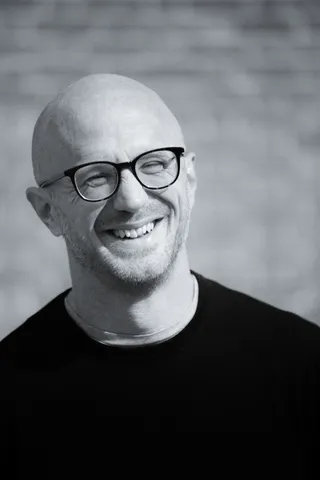Inside The World of Hypnosis with Tim Box

In today’s episode, Tim Box, a leading expert in hypnotherapy, is joining us. Discover the story behind Dan's initial skepticism about hypnosis and how an impromptu session turned everything around.
Tim shares his revolutionary control system that makes hypnosis approachable and incredibly effective. Whether you're curious about the power of the mind or looking for meaningful self-improvement, this episode promises to challenge everything you thought you knew about hypnosis.
Listen now!
Show Highlights:
- Can hypnosis cause self-transformation? [01:30]
- Do you want help with anxiety and self-esteem issues? [04:09]
- How do we set realistic expectations from hypnosis? [07:15]
- Does hypnosis cause epileptic seizures? [10:03]
- Learn to build a rapport with your client [13:14]
- What would make you a great practitioner? [14:21]
- Understand issues outside hypnosis before addressing them [17:26]
- The role of the control system in decision-making [18:12]
For more updates and my weekly newsletter, hop over to https://betterquestions.co/.
To learn more about Tim Box and his work, check out the below websites:
https://www.thecontrolsystem.co.uk/
https://www.youtube.com/channel/UCxxnncYTUHBOA5qTJDHoSIg
Transcript:
0:00 Dan. All right, what's up? This is Dan Barrett, and this is the Dan Barrett podcast, where every week we are talking about what it takes to build awesome businesses and awesome lives. It's wonderful to see you this week. I hope you're having a very good one. I am super excited because this week I'm talking to Tim box. Now, Tim box, a few years ago, I got hypnotized for the very first time, and it's important to back up and give a little context here. Before this, if you had asked me, I would have told you absolutely 100% hypnosis is nonsense, like it's placebo, it's goofy, it doesn't work. What have you now, I was interviewing, actually, on my old podcast, someone who's now a dear friend, Brad Chandler, who you can find over at limitless you.com and at the time, Brad was just getting into hypnosis, and he was like, Hey, let me hypnotize you. And I was like, Absolutely, let's do this. And we, you know, he ended up hypnotizing me, and I had what I would describe as a life changing experience. And we don't need to get into the too much of the specifics, but I had a level of sort of self transformation that I honestly did not think was possible in a, you know, two hour period. After that, I became completely obsessed with hypnosis, and I started reading every single book, looking at every single YouTube video, taking every single course, right? And I was just the way I do, all the way down on the rabbit hole on hypnosis. And you know, since then, I've become multiply certified in different types of hypnotherapy, and I've done a bunch of hypnosis, and some of you may know me through hypnosis, so it's become a big part of my life, right?
Okay, now, of everyone that I have worked with, and I have worked with most sort of of the leading people in the hypnotherapy space, I've read the clinical papers, I've read the books. I've got a giant hypnosis book collection. I have been down the rabbit hole of everyone in that group. Tim box, I think, is at the very top in terms of his ability to teach hypnosis. And here's why one Tim has a completely unique approach to hypnosis. It is not something that you see commonly taught in other places. His approach, what he calls the control system, is very unique. However, where Tim really shines is in making hypnosis approachable to regular people. One of the things I always took away from my time with Tim, Tim would make fun, I mean, very nicely. You'll see, he's very polite. He would make fun of me when I would do hypnosis voice, because I would go into hypnosis voice, I'd say, Okay, I'm gonna practice and say and I'd say, Okay, close your eyes. You're walking down a flight of stairs, so your eyes are getting sleepy or whatever, right? I would do hypnosis voice, and Tim would very directly say you don't need that. Of everyone who will tell you, and many people will tell you, hypnosis is totally normal state of mind. It happens all the time, whatever. Of everyone whoever tells you that Tim is one of the few people who actually walks the walk in the sense of he doesn't go into weird hypnosis voice when it's time to hypnotize you. He doesn't make you lie down.
He doesn't make you do anything. He is exactly who he is in this conversation, as he is when you hire him to be your Hypnotherapist. Tim has done incredible work helping people with anxiety, helping people with self esteem issues, just incredible, incredible breakthroughs, and he does it all in a way that doesn't feel weird or hypnosis to people. He is a truly incredible master of his craft and an excellent teacher, which is so hard to find in that space, I cannot tell you. So let me give you a recommendation. If you are interested in hypnosis, go look up Tim box. He's got dozens and dozens of incredible videos on YouTube. But if you want to dive into his particular method, which is what I did, I am a paying client of Tim's. I was a student of Tim's, and I got a ton out of it. You can go to the Control system.co.uk, that's the control system. Him.co.uk, and get to know a little bit about Tim and what he's all about. But without any further ado, let's get into this fascinating deep dive on hypnosis and everything having to do with it. With your friend and mind, Tim box, all right, so we were talking about the ritual of hypnosis. You were saying you were talking to someone at a hypnosis conference. They were making the argument the ritual is, what can serve us, yeah. And you are sort of making the counterpoint, dear, like, yes, it can serve us. But what was your sort of counter? Your counter to that? Well,
5:35 the counter argument to that is, of course, yeah, it might. It might serve the hypnotist, as in all the hypnotist is doing the things now, saying the things that I know are hypnosis. So it's taking me into hypnosis. Yeah, okay, it serves us, but I don't ever think it really serves in a therapeutic context. I should say I don't think it serves the client because it gives the client the idea that that ritual is necessary for them to make the sort of dynamic, positive changes that we want them to make if we say you have to do that ritual to me for me to get my result, then, okay, you'll always need a hypnotist to help make your positive changes, which isn't true. Now I know, I know that you can say the ritual can assist, but don't tell me you need to do it, because, trust me, you know, more than a decade into not using the ritual. There's never a case where you need the ritual to get the change, yeah. So I think that it can have negative effects. And the other thing is, as well, again, this is one of those things where I disagree with, with John, with, you know, with my actual original mentor, about is that, you know, he would say, ask the person in front of you what they think hypnosis is, and then give them that, you know, feed that back to them when you're doing whatever induction or hypnosis process you're doing.
Now, that's all well and good, but you don't know whether that person can create the sort of reality that they believe hypnosis is. You don't know if their mind's capable of that. So, you know, they think it is, oh, I'm going to be transported to this magical land of unicorns and fairies, and yet their mind simply doesn't work that way, then they're going to believe that whatever you did do isn't hypnosis. It didn't work. It didn't happen. Yeah, so if you're just trying to buy into their expectations, you are limiting yourself. You're kind of a slave to whatever they can do. So my thought here is that instead of trying to buy into people's expectations and just give them whatever ritual they think is correct, we should be trying to exceed their expectations and in some ways subvert their expectations, because when people come to see me, because we don't go near eyes, closed, trance stuff, the stuff that we actually do is so far left field that they're not even questioning whether it's right or wrong. They're just like, oh, okay, this is completely different than I expected. Yeah, you know. And my response to that is, you know, who would have thought it the stuff you saw on The Simpsons isn't actually what we're going to do in this therapeutic Yeah. Yeah, exactly. So, like,
7:55 you know, the example I always use is that if I had somebody, you know, I had somebody come and rewire my fuse box in my building recently, you know? And if I'd have said to him, Oh, you're putting the blue wire there and the brown wire there, I was expecting you to put those two wires the other way round. Yeah? You know, he wouldn't then say, Oh, well, just so that I can fulfill your expectations of what I'm doing here today, I'll switch them over for you, yeah? Because that would utterly screw up my electrics, because the current would be going in the wrong direction and all that sort of stuff. Yeah. So when somebody says to me, I was expecting some sort of close your eyes, imagine, go deeper into hypnosis ritual, and I'm telling them, actually, that's not what we do. Who are they, you know, who's, who's the expert in the room? Yeah, it turns out you don't need the ritual, because if you're doing something that blows their mind anyway, then they're perfectly happy with that. Yeah? They're not here to experience a ritual. They're here to get their change. Yeah? And however we get there, however we need to get there, they're normally very happy to accept the way that the expert in the room is taking them through that, you know? Yeah,
8:57 that's true. I wonder, I wonder if the whole the expectation of the ritual thing, like the, again, it's like the social container of what's happening. I think that is extremely important for stage hypnosis, right? Where it's like, Hey, we're gonna get a phenomena here, and everyone has to have some idea of what it's gonna look like, right? Otherwise, there's like, too much explanation that has to happen. So it's and it's interesting how the therapeutic and stage sides overlap a lot, but it's not explicit. Like, it's like, hey, we took this from stage hypnosis, right? Like, I can't remember if you told me this, but there's like, classical everybody kind of says this right here. Like, you should ask everybody that hypnotized if they have a history of epilepsy, and it's like, Well, the reason that we ask that is because you don't want them to have a seizure on stage. It's not that like epileptic people can't be hypnotized. It's like, a liar, right? So it's like, but everybody asked that because it's like, well, you're supposed to ask if someone has a history. That's it, exactly. So show me the evidence that hypnosis causes epileptic. Seizures? Yeah, there's none, because it isn't a thing. Yeah, it's just that we are taught, hey, cover your ass, guys. Because, you know, the idea that I want to know if you're gonna, you know, have a thing,
10:12 you talk, you talk to any stage hypnotist, and they'll say, yeah, what will happen if you get somebody up there who's epileptic, or if they're pregnant, that's another one, isn't it? You're not going to cause them to give birth on stage by hypnotizing them, but if you know three months later when they do give birth, there's any complications? Oh, what? What kind of Was it my fault? Oh, should I have not got hypnotized? Yeah, yeah, if somebody who's epileptic has a seizure two weeks after they've been on stage with a hypnotist who's going to get them and they did you do anything different over the last couple of weeks that are different from your normal? Oh, from your normal, oh, I was on stage with that hypnotist, wasn't it? So, you know, we have to be we have to be kept but then I don't think any more careful than, you know, your average healthcare provider would need to be careful. But it's like a lot of the things that we talk about are there because, yeah, they do come from looking after people in a stage environment, in a kind of, Hey, make sure you take care of people. Yeah, I think, you know, stage fitness get a bad rap here, because they're perceived by the therapeutic community as being the ones that are bringing our profession into disrepute, and people think we're going to take over control of their minds, but they're also the ones that teach us lots of really good, you know, due, diligent protocols that make sure that we're looking after people. Yeah, the highest
11:23 immediate feedback environment, which I think lends itself in any context, to rapid innovation, right? Like, if you're going to try thing and you're going to be embarrassed in front of 100 people, if it doesn't work, you tend hone that technique pretty fast. Yeah, yeah. So I've been mentioned this before. I got trained in the control system. It became, really the core of my own practice of hypnosis. I'm curious when you as a teacher of hypnosis, right? And someone who isn't just teaching hypnosis, but is teaching remedial hypnotism, right? So, hypnotherapy, essentially, right? Yeah, you are, you are doing, you are teaching a method of giving people massive breakthroughs. And I should mention, like, you know, for for those who aren't familiar with Tim, you've got a YouTube channel, which I had open, and then my computer shut down in the middle of our podcast, and so I don't have an open What is your YouTube channel? It's Tim box. Tim box mind coach. Tim box mind coach on YouTube, everyone should go check it out. Tim has also given a TED Talk. Specifically, a lot of your content is around anxiety, which, which is, in many ways, I think, like the predominant, you know, quote, unquote, mental health issue of our day. So when you are training people who come in with like, no experience in hypnosis to do this work, what do you think makes someone really good at it? Like, if someone's listening to this and they're thinking like, well, that sounds interesting, maybe I could do that. Like, what makes someone truly good at the work that you do?
12:58 That's a brilliant question. I would suggest, first of all, you've got to care about helping people. Yeah, you got, you got, that's got to be your driving factor. You can't, you know, one of the things we talk about on the training is, like, when we want to build rapport with a client, you know, we got to connect with them to the point where their subconscious is comfortable engaging with the process, you know. And there's one little phrase we have in the manual, if you like, which says, you know, show a genuine interest in your client and what they're telling you. And I get, I get the trainees to cross out the word show and write in the word have, because I want to stress this isn't just about pretending that you care about the person. You have to actually legitimately care about their result. I don't, I don't think you should be caring to the point where the session ends. And now you're thinking about it all evening, and you're wondering how we're going to get the result. It's, you know, once you finish the session, you have to disconnect from that person's issues. But when you're in that session, you've got to genuinely care about people.
So the type of person that makes a great practitioner is somebody you know, you've always got that person that is, that's the person I go to just to talk about my issues, and they're a great listener, and they just seem to give really nice advice that just makes sense, and it's they simplify things. If you're that person to the people in your circle, you know, and you feel like you do listen, you do have good thoughts about what they what people could be thinking about in a different way. You would make a great practitioner, if you are great at just interacting with people, on on a basic level, getting rapport with people, that would make a great practitioner. I don't think you know, somebody said to me once, can anybody be a hypnotist? Or do you have to, you know, sort of born with a talent, right? You know, like, it's like, it's Harry Potter, or something. You're born you're a hypnotist. Harry animal magnetism in my fingertips is what will, yeah, absolutely, the
14:44 genes, yeah. But any, anyone can, anyone can hypnotize people, anyone, yeah, you can. I mean, this is the thing that, one of the things that John's course taught me lunchtime on day one, we were sticking people to things, you know, with and. And so anyone can do it, yeah, but not everyone. I think makes a great practitioner, because you have to have the desire to help people above, above and beyond everything else. You know, I don't, I don't like those sort of people in the profession that are saying, oh, you know, hypnosis, that's where the money's at. The you know, the big bucks are in therapy, you know? I mean, who says that anyway? Because, you know, you wouldn't. There's easier ways to make money than deal one to one with people on a therapeutic basis, but, but you can make a good living from this profession if you genuinely care, and if your reputation builds with every client that you see. Yeah, and that's what I would say. I don't think young you need a great business head.
I certainly don't have a great business head, but I, you know, I worked hard because I gave a shit, basically, right? And as a result, have a very, I've always had a very successful practice, but I think it's because, as I say, people recognize when somebody is talking and listening to them who genuinely cares and is invested in their result. So I think, you know, as cheesy as it sounds, it sounds really cheesy, doesn't it, in terms of, we just got to care about people, to care about people. But I think, I think it is the case that if you, if you're just doing it because you want to be the goddamn hypnotist guy who can, you know, change people's minds and things like that. And I absolutely despise that attitude in our profession, the whole, you know, I'm the power hypnotist. I will put you under and tell you to stop it, that sort of thing. It's like, you know, which, again, I was exposed to very early on, and maybe I just got tired of it and thought that's, that's not, that's not the way it should be. But, yeah, a nice, you know, compassion, caring, ability to listen, the ability to gain rapport with people, that that's what I would say, a good traits in a good practitioner.
16:38 I mean, it strikes me as like, there's a lot a lot of like now hypnosis truisms that I have that I think came from you, but I can't quite exactly remember, but it's like something that almost stuck with me was being told anything that works in hypnosis will probably work outside of hypnosis, right? So it isn't the hypnosis per se, right? That's exactly right. You know, there's too many people in our profession that believe hypnosis is the reactive agent in the process, like it's the it's the medicine. Is the hypnosis, and that's not it at all. Hypnosis is a method by which we deliver the the remedy, if you like. It's not the hypnosis itself that is remedial. Yeah, yeah. And I think that's important. And I remember hearing that for the first time when I was going to talk by Irving Kirsch, who's one of the great researchers in our field. And he said, If you can't, if you don't know how to work with an issue outside of hypnosis, you shouldn't be working with it inside of hypnosis. And I'm sitting there thinking, but I know it's hypnosis that doesn't leave me with anything. Then, yeah, and it really challenged me. And then, and then, you know, a few years down the line, I remember that again. I'm like, Ah, get what that means now is that you've got to have it's not the answer, it's how you deliver. The answer is the hypnosis. It's almost like the truth is the truth, no matter what method you're using, the model, no matter what technique you're employing, it's how do you get to make sure that the person has understood the truth at a subconscious level, a belief level, and that's that's where the elements of hypnosis come in with the control system. Really, you could argue all we're really doing is using subconscious cues to check that what we've spoken about has been understood, has been accepted, and is likely now to make the difference as they move forward in their lives.
18:23 Well, I was gonna say so, for anybody who's curious, right? You can go to, it's the the control system.co.uk, right? So the control system.co.uk, you can learn all about what Tim does in the control system. That's where I first ran across you and decided to jump in and learn control. And the probably the highest compliment I can pay, because I've taken a lot of like, Tim says, All hypnosis people are like they have, you know, just piles of courses and book is, everybody's like this, right? We all love the field too much. We've taken a lot of hypnosis courses. There's a lot of people teach hypnosis very well. And you do, you teach hypnosis very well. Your process really cool. The highest compliment I can pay, though, is all the 80% of the control system is not hypnosis. The hypnosis is, here's the hypnosis, do it, and then the entire rest is a really, really clear and coherent, step by step process for helping people get past stuff that's holding them back, that's, that's the majority of the training, and more than really, I would say, the vast majority of people who are in this space, you have clearly done the work to distill, how do you work with someone who's stuck, figure out why they're stuck and get them past it. And the one of the best things about it is you can just do it on yourself. I find myself using control system on myself, like in the shower, you know?
I mean, like, just like working through the, oh, you know, I'm. Stuck on this thing and can make a decision. It's like, oh, okay, let's go through the blah, blah, blah, blah, blah. It is a highly reproducible process, which is really like the sign, I think, of someone who's done the work to make it coherent and of a piece.
So I cannot recommend, if you're listening to this, you're curious about hypnosis at all, you should go check out Tim's YouTube channel, for sure, which is Tim box mind coach on YouTube, but by all means, go check out the stuff that's on the website, which is the control system.co.uk. It gets my highest recommendation, which isn't worth that much, but it is there nonetheless. So thank you, Dan. I appreciate it. Yeah. Well, Tim, you are such a wonderful person. Man, you're such a joy to speak to. I cannot tell you thank you for being you are my inaugural interview on this podcast. I could not be happier, awesome, uh, without working out that way. So thank you so much. Man, I really appreciate you being on the show.
20:53 Absolute pleasure. Man, good to chat. Good to chat. All right, that's gonna do it for this week's episode. I hope you got a ton out of it. I know that I did. I really, really look up to Tim? I think he's a leading figure in the sort of lay hypnotism space, by which I just mean he's not a clinical researcher. He's out there doing hypnotherapy. I think he is a truly wonderful person to go learn from. So go do that. The control system.co.uk, is where you can find him. Or, like I said, He's all over YouTube. Just search for Tim box. It's spelled exactly the way that it sounds, and you will find more from him. As always, my blog is over at better questions.co. Go there to find out the best of what I'm learning and reading and thinking about every single week. Is one email. I really enjoy writing it, and I know a ton of people enjoy reading it. So better questions.co. Go figure that out. Subscribe. I don't know what you're waiting for. Go do that as always. I cannot tell you how much I appreciate having you here. I really, really do thank you for listening, and I will see you next week. Cheers. You.
Better Questions Newsletter
Join the newsletter to receive the latest updates in your inbox.



